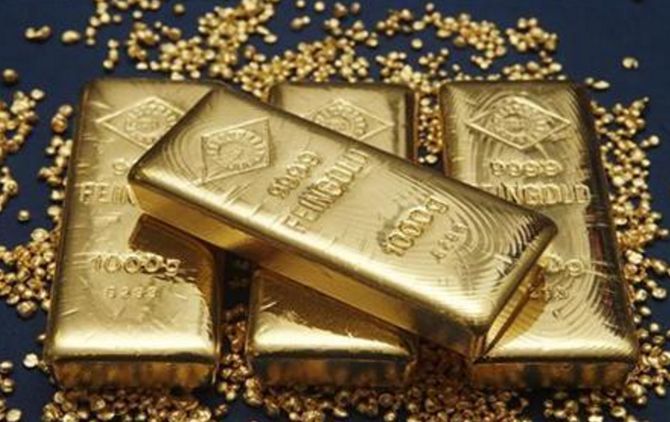Not only is gold a hedge against currency depreciation, rising crude prices and uncertainty, it is up 7 per cent (in dollar terms) in the past 12 months, says Devangshu Datta.

The rupee has fallen across the board over the past three months.
It has lost ground against the dollar, the euro, the yen and the Chinese renminbi. It has even lost value versus the pound, which is perhaps, the most surprising.
The weakness has come about as a result of several trends.
A higher trade deficit has led directly to a higher current account deficit. Forex inflows have also eased off, leading to further pressure.
A rise in global crude prices is partially responsible for the trade deficit but there are other factors at play as well.
The trade deficit arises from an excess of physical imports over exports. It is running at around $50 billion -- that's about two per cent of the gross domestic product (GDP).
Indian crude oil imports cost about 22 per cent more last year. Other imports also rose in value.
Gold imports are up, both in price and in volume and gold is the second-largest item in the import basket.
Diamond imports are also up -- this may translate into higher exports.
If the CAD rises, it will likely lead to a further weakening.
Note that an acceleration in GDP growth rates as projected will be accompanied by a rise in imports.
Apart from a direct relationship between faster growth and higher energy consumption, capital equipment imports are likely to be required to buttress faster growth.
Forex inflows slowed in the last quarter after nine strong months.
Overall, FDI (foreign direct investment) in 2017-18 dipped to $27 billion from over $40 billion in 2016-2017.
Portfolio inflows dropped in the fourth quarter (January-March 2018).
FPIs were net debt-sellers in Q4 due to the RBI limits being hit, and also due to an extended bear-market in Indian bonds.
FPIs bought a net Rs 1.45 trillion in 2017-2018 (about $22.5 billion) comprising Rs 260 billion equity and Rs 1.19 trillion of rupee-debt.
That's higher than net buying of Rs 484 billion ($7.5 billion) in 2016-2017 and it balanced off lower foreign direct investment.
A weaker currency means more inflation, but it's a positive for exporters.
However, the Punjab National Bank scam and the kneejerk response of banning Letters of Understanding has raised the cost of capital for exporters.
Critical export-oriented industries like ITES (which is 'Invisibles', not physical exports) and pharma are under pressure due to changes in US regulations.
There will be forex volatility through 2018. The US Federal Reserve is going to raise rates for sure, at least twice.
The European Central Bank and the Bank of Japan are both maintaining Quantitative Easing programmes and negative policy rates. However both central banks have indicated that there will be tightening and "normalisation".
The Bank of England is walking a tightrope, waiting for clarity on Brexit.
If three major hard-currencies tighten money supply, forex rates will swing, though we can't guess at directions.
This will mean higher hard currency debt yields. That could mean a pull-back out of risky Third World assets.
If there are lower forex inflows, that could trigger more rupee weakening.
A vicious circle could start operating if crude prices also trend up at the same time.
India has substantial reserves so there's no fear of a run on the rupee.
Back in 2013-2014 when the currency came under pressure, the RBI took desperate measures, asking banks to organise foreign currency deposits, which it swapped, while bearing the currency risk.
Raghuram Rajan also attacked inflation as the optimal way to stabilise the rupee. Those are possible tactics for Urjit Patel if similar situations of high crude, rising CAD and falling rupee occur.
For investors and traders, shorting the rupee is tempting, along with long commodity futures of crude.
In a selective way, exporters should see a pick up as well.
Most of India's exports come from areas such as agro-exports, textiles, leather, etc. These are not strongly correlated to global GDP expansion.
Vehicles and engineering exports are however, and pharma could also bounce back.
But the really intriguing possibility is gold. It is a traditional hedge against inflation and uncertainty.
Inflation is picking up globally, though it's a long way from being a threat.
Gold is up 7 per cent (in dollar terms) in the past 12 months. Prices are forex-denominated.
Hence, gold is also a hedge against currency depreciation.
Photograph: Heinz-Peter Bader/Reuters










